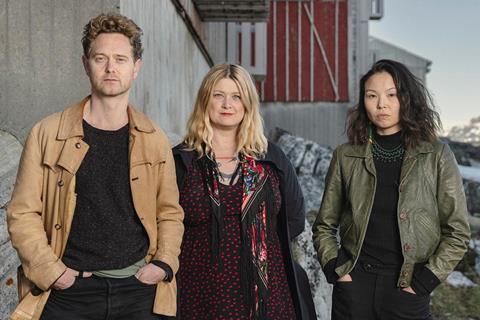
Danish filmmaker Isabella Eklöf today (September 20) starts shooting her second feature Kalak in Copenhagen, followed by a shoot in Nuuk and Kulusuk in Greenland.
Eklöf previously directed Sundance 2018 selection Holiday and co-wrote Border with Ali Abbasi and John Ajvide Lindqvist, as well as directing episodes of Servant for Apple and Industry for HBO Max.
She wrote the Kalak script alongside Kim Leine and Sissel Dalsgaard Thomsen, adapted from Leine’s debut novel of the same name.
The story follows Jan, a nurse who is also a father, who was sexually abused by his father as a teenager. Working in Nuuk, Greenland, he tries to connect to the culture with sex. When someone calls him a Kalak, a Greenlandic word with a double meaning of both a “true” and ”dirty” Greenlander, he wears the epithet as a badge of honor. But ultimately he has to confront his father. The film is based on a true story.
Emil Johnsen (All The Beauty) will star as Jan. The cast will also feature Asta Kamma August (The Pact), Søren Hellerup, Berda Larsen, Connie Kristoffersen and Hans-Jukku Noahsen. Nadim Carlsen (Holiday, Border, Holy Spider) serves as DoP.
Maria Møller Kjeldgaard produces for Manna Film, and Scanbox will distribute in the Nordics. Other partners are Momento Film, Film i Väst, Mer Film, Lemming Film, Made, Polarama Greenland and Beofilm. Backers include The Danish Film Institute, DR, FilmFyn, Creative Europe, Government of Greenland, NAPA, Sermersooq Municipality Culture Fund, The Swedish Film Institute, SVT, The Norwegian Film Institute, Mediefondet Zefyr, NRK, Netherlands Film Fund, Finnish Film Foundation, Yle and Nordisk Film & TV Fond.
Kalak is being readied for a 2023 release.
The director said: “At its core, this film is about fathers, and how trauma is brought down through generations. Jan has been raped by his father just as the Greenlandic culture has been raped by a foreign aggressor. I hope to land with a film that is dramatic and intense, dirty in a lyrical way, desperate and controlled. And I hope to display the complexity and mess that is post-colonialism in a truthful, hurtful, and thoughtful manner.”






![The Brightest SunScreen[Courtesy HKIFF]](https://d1nslcd7m2225b.cloudfront.net/Pictures/274x183/3/5/0/1448350_thebrightestsunscreencourtesyhkiff_312678.jpg)


















No comments yet